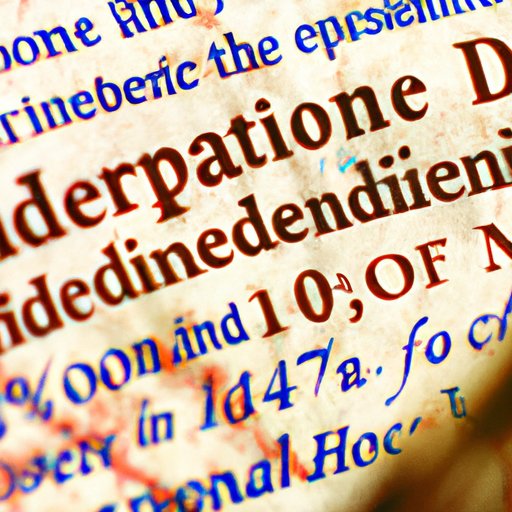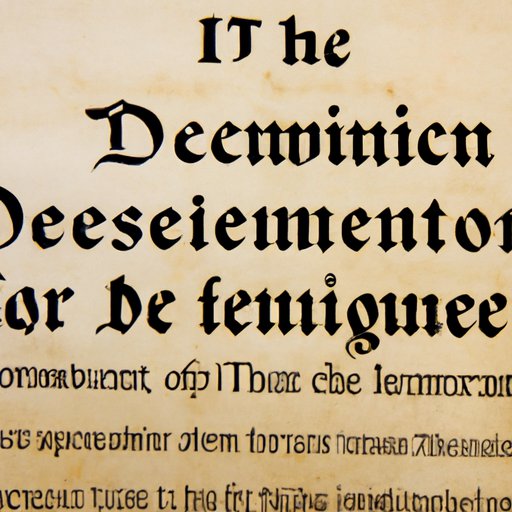Introduction
The Declaration of Independence is a document written by the Founding Fathers of the United States in 1776 to declare their independence from Great Britain. The document outlined the reasons why the colonies were seeking independence, as well as the philosophical underpinnings and principles of the newly formed nation. In this article, we will explore the reasons for writing the Declaration of Independence, including its historical context, the events leading up to the writing of the document, the arguments and philosophies behind it, and its impact and significance today.

Examining the Historical Context of the Declaration of Independence
In order to understand the reasons for writing the Declaration of Independence, it is important to examine the historical context in which it was written. At the time, the American colonies had been under British rule for over 150 years. During this period, the relationship between the colonies and Great Britain had become increasingly strained. This was due to a number of factors, including the political, economic, and social conditions in the colonies.
Exploring the Events Leading Up to the Writing of the Declaration of Independence
The events leading up to the writing of the Declaration of Independence began in 1774, when the First Continental Congress was convened in Philadelphia. This was a gathering of delegates from the thirteen colonies in response to the Intolerable Acts, a series of laws passed by the British Parliament to punish the colonists for their part in the Boston Tea Party. At the Congress, the delegates drafted a petition to King George III asking for the repeal of the acts. However, the petition was rejected and the delegates decided to meet again the following year.
The following spring, the Battles of Lexington and Concord occurred, marking the beginning of the Revolutionary War. The Second Continental Congress met shortly after, and on June 7, 1776, Richard Henry Lee of Virginia proposed that the colonies declare their independence from Great Britain. The resolution was approved, and a committee was appointed to draft a formal declaration of independence.
Analyzing the Arguments and Philosophies Behind the Declaration of Independence
The Declaration of Independence was written to outline the reasons why the colonies were seeking independence from Great Britain. It also served as a statement of the new nation’s philosophy and principles. Thomas Jefferson, who wrote the majority of the document, drew heavily on the ideas of natural rights, self-government, and equality. He argued that all people are endowed with certain inalienable rights, such as life, liberty, and the pursuit of happiness. He also argued that governments should be based on the consent of the governed, and that all people are equal and should be treated as such.
Investigating the Impact of the Declaration of Independence
The Declaration of Independence had an immediate impact on the colonies and the world. After the document was adopted, the colonies declared themselves independent states and began to form their own governments. In addition, the Declaration served as a rallying cry for others around the world who were seeking freedom from oppressive regimes. Over time, the document has come to symbolize the ideals of freedom, democracy, and human rights.

Looking at the Significance of the Declaration of Independence Today
The Declaration of Independence is still significant today. Its legacy can be seen in the constitutions of many nations around the world, which draw heavily on the document’s principles of natural rights, self-government, and equality. In addition, the document serves as a reminder of the courage and determination of the Founding Fathers in the face of adversity, and is a powerful symbol of the power of democracy.

Comparing the Declaration of Independence to Other Revolutionary Documents
The Declaration of Independence can also be compared to other revolutionary documents from around the world. One example is the United States Constitution, which was written in 1787 and outlines the structure of the federal government. Another example is the French Declaration of the Rights of Man and of the Citizen, which was written in 1789 and outlines the rights of citizens in France.
Conclusion
In conclusion, the Declaration of Independence was written to declare the colonies’ independence from Great Britain and to outline the principles and philosophies of the newly formed nation. It was written in response to the political, economic, and social conditions in the colonies, as well as the events leading up to the war. The document has had an immense impact on the world, and its legacy can be seen in the constitutions of many nations. Today, the Declaration of Independence remains a powerful symbol of freedom, democracy, and human rights.
(Note: Is this article not meeting your expectations? Do you have knowledge or insights to share? Unlock new opportunities and expand your reach by joining our authors team. Click Registration to join us and share your expertise with our readers.)
